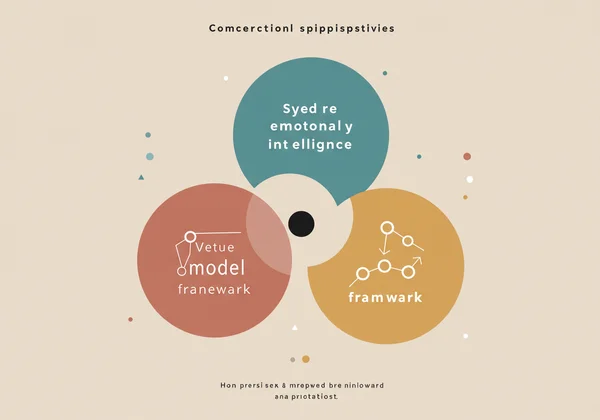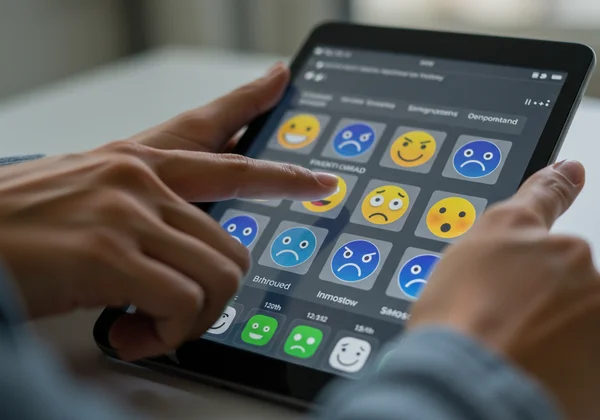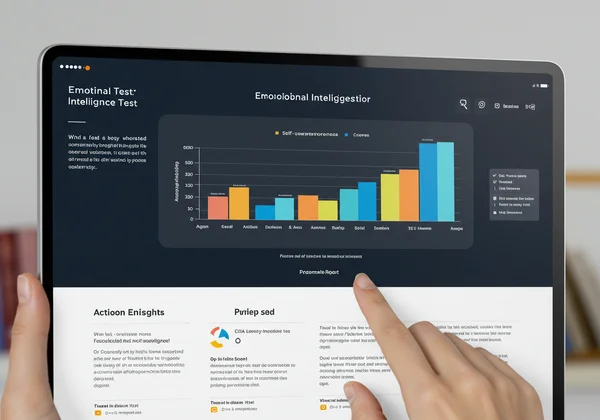EI Test Models: TEIQue, MSCEIT, Goleman Compared
November 11, 2025 | By Evelyn Reed
Navigating the world of emotional intelligence can feel like exploring a vast library with countless books on the same topic, each with a different perspective. You know you want to understand your emotions better, but the sheer number of models and assessments can be overwhelming. If you've ever asked, What is the EI test?, you've likely encountered names like Goleman, TEIQue, and MSCEIT. Understanding these foundational models is the first step toward meaningful self-discovery.
This guide will demystify the three most influential emotional intelligence frameworks. We'll break down how they differ, who they're best for, and how you can find a reliable assessment that fits your personal and professional growth goals. Ready to gain clarity on your journey? You can start by exploring a scientifically-backed emotional intelligence assessment.

Understanding Key Emotional Intelligence Models
To choose the right ei test, it’s essential to know the theories behind them. Each major model approaches emotional intelligence from a unique angle, influencing the types of questions you'll be asked and the insights you'll receive.
The Trait Emotional Intelligence Questionnaire (TEIQue)
Developed by psychologist K.V. Petrides, the Trait Emotional Intelligence Questionnaire (TEIQue) views emotional intelligence as a collection of self-perceived abilities and behavioral dispositions. In simpler terms, it measures how you believe you perform in emotionally-relevant situations. It’s part of your personality.
-
What it Measures: TEIQue assesses 15 distinct facets, including adaptability, assertiveness, emotion perception, self-esteem, and stress management, which are then grouped into four main factors: Well-Being, Self-Control, Emotionality, and Sociability.
-
How it Works: This is a self-report questionnaire. You'll respond to statements like "I'm usually able to influence the way other people feel" on a rating scale.
-
Pros: It’s intuitive and provides a holistic view of your emotional self-concept. The results are deeply personal and excellent for self-reflection and personal development.
-
Cons: Because it’s based on self-perception, results can be influenced by your current mood or a lack of self-awareness.

The Mayer-Salovey-Caruso EI Test (MSCEIT)
Pioneered by John D. Mayer, Peter Salovey, and David R. Caruso, the Mayer-Salovey-Caruso EI Test (MSCEIT) is an "ability-based" test. It treats emotional intelligence not as a personality trait, but as a distinct mental ability, much like IQ. It measures how well you actually perform tasks and solve emotional problems.
-
What it Measures: MSCEIT evaluates four core abilities: Perceiving emotions in faces and images, Using emotions to facilitate thought, Understanding complex emotions and emotional transitions, and Managing emotions for personal growth.
-
How it Works: Instead of rating your own skills, you complete tasks. For example, you might be asked to identify the emotions expressed in a photograph or determine which mood would be most useful for a specific creative task.
-
Pros: It's considered a more objective measure of emotional skill, as there are "correct" answers based on consensus or expert scoring. This makes it valuable in clinical and research settings.
-
Cons: It can feel less personally relevant than trait models and may not fully capture how you apply these skills in your daily life. It measures your maximum potential, not your typical behavior.

Daniel Goleman's Mixed Model of Emotional Intelligence
Daniel Goleman, who popularized the term "emotional intelligence" with his 1995 book, developed a "mixed model." This framework combines both abilities (like those in MSCEIT) and personality traits (like those in TEIQue) into a set of competencies that are crucial for workplace success.
- What it Measures: Goleman’s model is often broken down into four or five domains: Self-Awareness, Self-Management (or Self-Regulation), Social Awareness, and Relationship Management. Within these are specific competencies like emotional self-control, empathy, influence, and teamwork.
- How it Works: Assessments based on this model, like the Emotional and Social Competence Inventory (ESCI), often use a "360-degree" feedback method where you, your peers, and your superiors rate your performance on various competencies.
- Pros: It is highly practical and directly applicable to leadership and professional development. Its focus on observable behaviors makes it a favorite in corporate settings.
- Cons: The model is very broad, sometimes mixing personality traits with skills, which can make precise measurement challenging.
Comparing TEIQue, MSCEIT, and Goleman: Types of EI Tests
Understanding the fundamental differences between these models helps you appreciate that there isn't one "single" way to measure emotional intelligence. The right approach depends entirely on your goals.
Key Differences in Approach and Measurement
| Model | Type | Core Concept | Measurement Method | Best For |
|---|---|---|---|---|
| TEIQue | Trait Model | EI as part of your personality | Self-report questionnaires | Personal development, self-reflection, coaching |
| MSCEIT | Ability Model | EI as a mental skill, like IQ | Performance-based tasks | Academic research, clinical assessment |
| Goleman | Mixed Model | EI as a set of competencies | 360-degree feedback, self-report | Leadership development, team building, HR |
The primary distinction lies between what you think you do (TEIQue) versus what you can do (MSCEIT) versus what you actually do at work (Goleman). Each offers a valid but different lens through which to view your emotional world. For most people seeking personal growth, understanding their self-perceptions through a trait-based approach provides the most actionable starting point. You can discover your EI score to see where you stand.
Who Benefits Most from Each Emotional Intelligence Test?
- The Self-Improver: If you are a student or professional focused on personal growth, a test based on the TEIQue model will be highly beneficial. It offers a comprehensive look at your emotional identity and provides a clear roadmap for self-improvement.
- The HR Manager or Leader: For talent assessment, leadership development, or team building, Goleman's competency-based model is often the standard. It provides a framework for evaluating the "soft skills" that drive performance.
- The Researcher or Clinician: If you need an objective, standardized measure of emotional reasoning ability, the MSCEIT is the gold standard for its scientific rigor and focus on pure skill.
Finding Your Best Emotional Intelligence Test
Choosing the right assessment is a crucial step in your self-development journey. It's about finding a tool that not only gives you a score but also empowers you with understanding and a path forward.
Factors to Consider for Your EI Assessment
When selecting an EI assessment, ask yourself these questions:
- What is my goal? Am I looking for deep self-reflection, professional development, or academic insight?
- How will I use the results? Do I want a simple score, or do I need actionable advice and a personalized report?
- Is it scientifically grounded? Does the test draw from established theoretical frameworks like TEIQue or MSCEIT?
- Is it accessible? Can I take it online easily, and are the results presented in a way I can understand?
How Eitest.org's Approach Aligns with Scientific Rigor
At our platform, we believe in providing an accessible yet powerful tool for everyone. Our online EI test is built upon the established principles of leading scientific frameworks, including the comprehensive self-perception approach of TEIQue and the foundational skill categories of MSCEIT.
This hybrid approach allows us to give you a reliable snapshot of your emotional tendencies and self-perceptions, which is the most practical foundation for real-world growth. We go a step further by offering an optional AI-powered analysis that provides personalized insights and actionable strategies tailored to your unique responses. This transforms your results from a simple number into a dynamic guide for improving your relationships, career, and overall well-being. Start your journey and take the free EI test today.

Make an Informed Choice for Your EI Journey
The world of emotional intelligence testing is rich and varied. Whether it's the personality-focused TEIQue, the ability-based MSCEIT, or the competency-driven Goleman model, each offers valuable insights. The key is to choose an assessment that aligns with your goals for self-discovery and growth.
A scientifically-grounded test provides the reliable foundation you need, while personalized feedback turns that knowledge into power. It’s not just about knowing your score; it's about understanding what it means and how you can use it to become a more emotionally intelligent version of yourself.
Ready to explore your emotional strengths with a scientifically-backed, personalized assessment? Take the free EI test on Eitest.org today and gain actionable insights for your growth!
Frequently Asked Questions About Emotional Intelligence Tests
What is the EI test, and how does it work?
An EI test is an assessment designed to measure various aspects of your emotional intelligence. It typically involves a series of questions or tasks that evaluate your ability to perceive, understand, and manage your own emotions and those of others. Our online EI test uses a questionnaire format to create a profile of your emotional strengths and development areas, which you can explore further with a personalized AI report.
What are the 4 pillars of emotional intelligence according to Goleman?
Daniel Goleman's influential model outlines four pillars of emotional intelligence:
- Self-Awareness: Understanding your own emotions, strengths, and weaknesses.
- Self-Management: The ability to control your impulses and manage your emotions in healthy ways.
- Social Awareness: The capacity to understand the emotions, needs, and concerns of other people (empathy).
- Relationship Management: The skill to develop and maintain good relationships, communicate clearly, inspire others, and manage conflict.
What is the difference between IQ and EQ?
IQ (Intelligence Quotient) measures cognitive abilities like logic, reasoning, and problem-solving. EQ (Emotional Quotient), or EI, measures your ability to understand and manage emotions. While a high IQ can help you get a job, a high EQ is often what helps you succeed in that job, especially in leadership roles, by enabling better teamwork, communication, and resilience.
How can an EI test help my career progression?
An EI test can be a powerful tool for career growth. By identifying your emotional strengths and weaknesses, it can help you improve communication, become a more effective leader, manage workplace stress, and build stronger professional relationships. Many employers now recognize that a high emotional intelligence score is a key indicator of job performance and leadership potential. Discover how you can leverage your strengths by taking our free ei test.
What is considered a good EI score?
Unlike an IQ test, there isn't a universal "good" EI score. Most assessments provide results that show how you score in different areas relative to a general population. The goal isn't to achieve a perfect number but to understand your unique emotional profile. A "good" outcome is gaining awareness of your strengths and identifying specific areas where you can grow, then using that knowledge to improve your life.